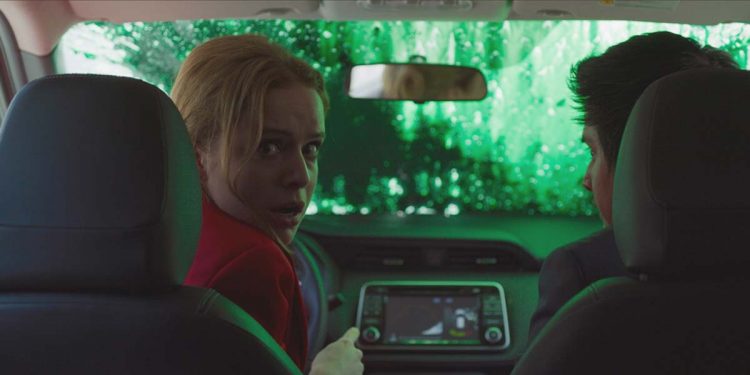In the press notes for “New Order”, director Michel Franco announces that the film is a warning: “If inequality is not addressed by civic means, and if all dissenting voices are silenced, chaos ensues.” The directive makes sense. “New Order”, which depicts a dystopian Mexico that seems close enough to reality to be unnerving, covers a series of increasing disasters as the wedding of an upper-class family is interrupted by violent protests that take the entire country by storm. By the end of the film, audiences will feel as if they have been bludgeoned beyond repair. Such is the visceral nature of Franco’s vision of a Mexico existing on the brinks of nihilism. Even at a brief 86 minutes, “New Order” feels exhausting. It is also fascinating, repulsive, hypnotic, frustrating and provocative at turns.
The opening minutes project disparate images that only make sense as the film goes on. The images soon give way to a brief scene in a hospital where patients and relatives, alike, are being shepherded out of the facility. In the confusion, we see a doctor hand an elderly man a bill for 200,000 pesos. We don’t know what is afoot, but it’s clearly bad as we cut to a swathe of dead bodies covered in that lurid green paint again. Franco cuts away from the images. For the time being, at least. The rest of the opening half an hour moves to steadier ground, even if the uncertainty still creeps through. At a lavish house in the city, an upper-class family is celebrating a wedding between Alan and Marianne, a couple of evenly matched wealth. The compound is swarming with the Mexico’s richest, exchanging gossip about their money and their purchases as the help – mostly people of colour – manage the festivities. A brief stream of green water from the tap unnerves the bride’s mother, but things return to joviality – for a time.
Soon, the elderly man from the opening arrives. He is a former servant hoping to receive a loan to tend to his sick wife. The money is everything for him, and clearly little for the family. But Marianne’s mother is ambivalent about her responsibility to a servant she has not seen in years. Marianne is more earnest, although her sympathy is interrupted by her own wedding festivity. In this opening half an hour – covering an hour or so of the party – Franco is at his most technically proficient. Yves Cape’s camera moves in and out of the house, weaving through the guests and building up a tension that we don’t know will come to what. The judge to officiate the wedding has been held up by protests on the road – and so the wedding is temporarily delayed. When Marianne decides to take a servant to assist her former employee, we know things will go awry. And they sure do. The first act ends when a swarm of protestors descend on the house and begin to murder some of the guests. From there, all bets are off as social satire gives way to dystopian horror giving way to nihilistic philosophical sermon.
The next hour covers a few weeks as the protests take on countrywide significance. Whereas the film’s opening third moved between various characters and plot strands, the last two-thirds focuses on a single character whose abduction leaves the remaining characters caught in a cat-and-mouse game of find the hostage. It’s here Franco reveals his more didactic arguments, presenting “New Order” as a dialogue with varied dividends. As the film grows angrier, the images become more lurid, “New Order” becomes messier and Franco’s direction more schematic, visceral and complicated.

“New Order” is an ambitious work as it weaves between moments of horror and critique. Its ambition feels relentless, fascinating and punishing. The way that the film’s descent into nihilism feels emotionally exhausting is a credit to its ability to affect. Franco is deliberate, de-emphasising character as he presents each figure here as a “type”. The idea works better in the first half, which feels more emotionally ambivalent than in the second half, which depends on a level of emotional resonance the film seems uncommitted to. By the climax of the film, Franco wants “New Order” to be a philosophical argument but without the surety. He wants to provoke and it’s clear the things he holds back (flattening certain character arcs, refusing to provide interiority to others, the disorienting time-jumps) are part of his own intentions to pull the rug out from the audience. The film employs a final twist that is shocking even if it does not quite offer catharsis. But, in stretches towards the film’s end, “New Order” feels one draft away from a tighter conclusion.
That Franco intends “New Order” to be a political critique is clear. So, the film feels rockier when that critique is swathed in lens that are politically ambiguous. I found myself wondering who the film was for? For all his scepticism about the careless upper-class, Franco’s camera finds himself too often telling the story from their perspective, making “New Order” come across more as a warning to the rich, than a film of empathy for the poor. The fact that “New Order” is so perversely anti-cathartic and even muddled in its messaging feels like all the more reason to consider it thoughtfully, though.
If the cinema of the Americas at TIFF this year has announced anything, it has been a ferocious awareness of the muddled nature of private and public politics. Franco’s thesis is watered down by his own over-focus on delivering a final sleight-of-hand to audiences that can’t work to deepen the films own accidental – or infantilising – of its lower-class characters. Franco’s vision might be deepened by more interest in the psychology of all his characters. But, then, “New Order” is fascinating and repulsive in the same breath – even as it riffs on familiar genres and tropes – for the sheer conviction it has in its own self. In Franco’s world, hope is an illusion and everything is terrible. It is, perhaps, not a rewarding presentation of a revolution but it is a gripping one. It is fascinating in all the ways it delivers its messages, and even more fascinating for all the way it seems to counter-argue against itself.
It works, in theory – up to a point. But you feel so beaten down by the end of film that it’s hard to know if the breath you let out is one of understandings and illumination or just relief that it’s over. For better, and for worse, it’s unlike anything you’re likely to see this year. Days after seeing it, images from the film’s most horrifying sequences linger in my mind. Maybe Franco knows exactly what he’s doing.
New Order played at TIFF in the Contemporary World Cinema section after premiering at the Venice Film Festival, where it won the Silver Lion – Grand Jury Prize.





